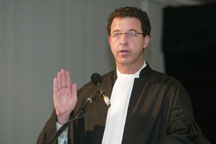 DAMASCUS/BEIRUT, 19 Jan 2006 (IRIN) – With the imminent arrival of Serge Brammertz, the United Nation
DAMASCUS/BEIRUT, 19 Jan 2006 (IRIN) – With the imminent arrival of Serge Brammertz, the United Nation
The official reaction in Damascus to the arrival of Brammertz, who comes from his post as deputy prosecutor of the International Criminal Court (ICC) in The Hague, has been relatively muted.
In a recent editorial, state daily Al-Thawra said Syria was ready for “full cooperation” with the commission, but called on Brammertz to sign an agreement defining “the concept of cooperation.”
“Talking about the future requires the avoidance of previous mistakes in assessing cooperation,” the writer stated.
Resolution 1664, endorsed by the UN Security Council last year, threatens Damascus with unspecified “further action” unless it cooperates “unconditionally” with the inquiry.
Sceptics also point to the fact that three key witnesses who previously testified against Syrian officials were later found to have given false statements. Two of them were arrested, while the third fled to Syria.
Damascus, meanwhile, has refused a request by UN investigators to question Syrian president Bashar al-Assad.
"Syria is committed to its independence and sovereignty,” Syrian Information Minister Mehdi Dakhlallah told Egyptian Radio on 12 January. “This [interrogation of al-Assad] is a red line that cannot be crossed."
The UN request to question al-Assad followed statements by former Syrian Vice President Abdel-Halim Khaddam, currently in exile in Paris. He said that the Syrian president had threatened Hariri on a number of occasions in advance of last February’s assassination.
Khaddam later accused al-Assad of directly ordering the bombing that killed the Lebanese PM along with dozens of others.
In Beirut, Prime Minister Fouad Siniora was quick to assert that his country would fully cooperate with the UN commission. Siniora has repeatedly said that the replacement of Mehlis as chief investigator would have no impact on the probe.
However, "there will undoubtedly be attempts by those who feel threatened by Brammertz to discredit him," said Nicolas Pelham of the International Crisis Group think-tank.
"Syria continues to have many allies in Lebanon who feel their survival is intertwined with Syria’s,” he added. “In particular, the move to cut Lebanon loose from Syria’s moorings has had a destabilising effect on the country’s sectarian balance."
According to Pelham, Mehlis fell victim to character assassination during the course of his work with the commission. By the end of his tenure, Mehlis was widely perceived as partisan – one of many political players in Lebanon rather than an unbiased outsider.
"It’s important that the UN remain focused on finding the specifics of the truth, include a broad range of sources in future reports and remain studiously distant from accusations of elevating one sect above another," Pelham said.
[ENDS]



